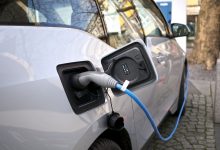New battery technology that could see electric vehicles being charged in a fraction of the time of current standards – and powered by either electricity or hydrogen – has been developed by a team of Scottish scientists.
Battery storage or fuel cell storage – this is a polarising topic for those in the game of developing electric car technology.
While a battery electric vehicle has the advantage of instant torque, quiet ride and zero tailpipe emissions, currently the speed with which an electric car can recharge is at best 30 minutes on a fast charger, or more often overnight if charged through a standard 3 phase outlet.
Hydrogen fuel cell technology – which stores the energy for the car in the form of hydrogen – is also tailpipe emission free, and while theoretically a fuel cell vehicle can be refuelled as quickly as a petrol or diesel vehicle, the technology is far more expensive.
Now, researchers at the University of Glasgow say they have created a flexible solution using nanomolecules that allow energy to be stored and output in the form of either electricity or hydrogen gas.
The breakthrough uses what the researchers are describing as an ‘exotic rust’ – a metal oxide that when added to water, can be charged with electricity.
Using this technology – which is still in prototype stage – EV drivers would be able to refuel cars in much the same way as is done at the petrol station today.
First, the used ‘rust’ liquid is removed using a special nozzle at the pump, then the car is refuelled using a second nozzle to replenish the car’s energy stores.
Professor Leroy Cronin, Regius Chair of Chemistry at the University of Glasgow, has published the breakthrough research in the journal Nature Chemistry and says the ‘flow’ liquid battery could be the answer to making EVs a real contender against fossil-fuel vehicles.
“Energy storage solutions that can act as both batteries and fuel generation devices (depending on the requirements of the user) could therefore revolutionize the uptake and use of renewably generated energy,” wrote the researchers in the journal.
The flow battery would give an EV about the same range as ICE cars, and that it does not age as fast as conventional EV car batteries.
“Our approach will provide a new route to do this electrochemically and could even have application in electric cars where batteries can still take hours to recharge and have limited capacity.
“Moreover, the very high energy density of our material could increase the range of electric cars, and also increase the resilience of energy storage systems to keep the lights on at times of peak demand,” he said in a press release.







